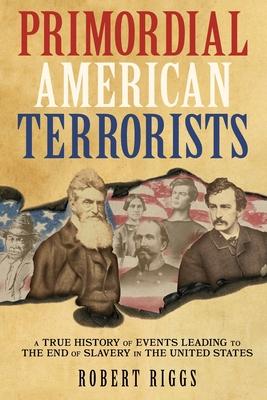Primordial American Terrorists presents a stunning new interpretation of events leading to the end of legal slavery in the United States. It tells a gripping story, not only of terrorists who struck suddenly and savagely out of intense passion for a cause, but also, of equally passionate men and women who dedicated themselves to bringing about social justice through advocacy and other non-violent means. It is for any reader who enjoys learning about humanity through the lens of a history that is never fictionalized. Whenever a new act of terrorist violence bursts upon us, we strain to find the comfort of a logical explanation. That effort, though, is fraught with paradox. One of the most profound is the duality observed in the personality of the perpetrator. In lives apart from their defining act, terrorists frequently are lauded by friends and family as upstanding individuals, distinguished for kindness, good behavior, and charity. It has been noticed that terrorists, in their mental makeup, tend to resemble each other. Our mission is to address the questions: How and why?
Primordial American Terrorists highlights the gross overreaction effect produced by terrorism. That backlash effect is a new and insightful way to understand the American Civil War. It is an insightful window into today's world, which now confronts more terrorist-induced backlash which threatens to transform long-simmering unrectified injustice into global armageddon.
Primordial American Terrorists is also a personality study. It applies a magnifying glass to the characters of its protagonists. A central discovery of 20th century terrorism scholar Walter Laqueur is that terrorists, in many respects, tend to resemble each other. Primordial American Terrorists builds on that insight to develop a comparison between terrorists and other political actors who were strongly aligned with their cause. Primordial American Terrorsts portrays in intimate, well-documented detail how terrorists interacted with non-terrorists in ways that highlight the fundamental differences in their personalities.
The terrorist personality this series reveals is highly distinctive. Fortunately, it is also highly uncommon. It is one which defies advance identification, because its protagonists tend to be upstanding and praiseworthy in their lives apart from the defining act. Terrorism, the author contends, should properly be classed with crimes of passion. The terrorists examined in Primordial American Terrorists believed, with their whole hearts, that in committing egregious bloodletting crimes they were acting out of the highest form of love, and that they were doing it with divine approval.
The terrorists chronicled were highly intelligent people with IQs well above normal. They were profoundly ascetic and self-disciplined. The same profile the series has developed through examining historical terrorists also applies to today's terrorists. As such, it is inevitable that no amount of airport screening, either literally or figuratively speaking, will ultimately quell terrorism and prevent it from happening. This realization may save the globe from burning while we become carried away with wild overreactions that will never stamp out terrorism. In fact, they are likely to fuel the flames ever hotter, until our leadership finally comes to understand that the best answer lies not in metal detectors, but in insight into the causes of terrorism as well as the personality of its perpetrators.
